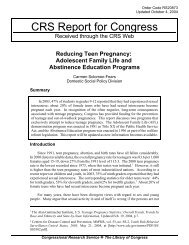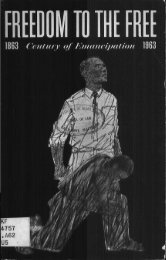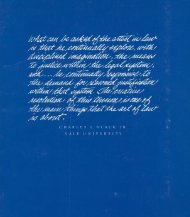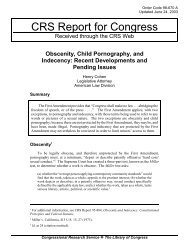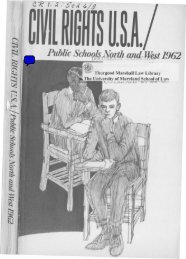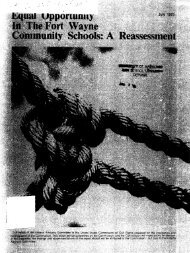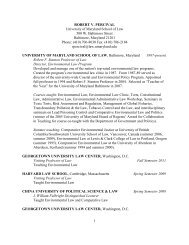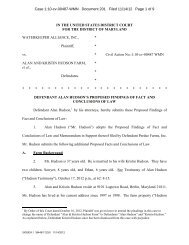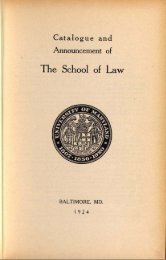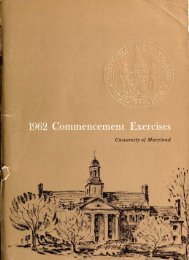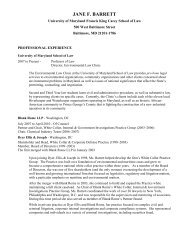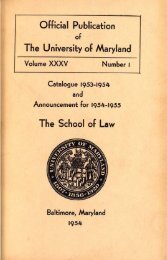journal - University of Maryland School of Law
journal - University of Maryland School of Law
journal - University of Maryland School of Law
Create successful ePaper yourself
Turn your PDF publications into a flip-book with our unique Google optimized e-Paper software.
36 MD. JOURNAL OF INTERNATIONAL LAW & TRADE [Vol. 14<br />
commerce in the United States .... '00<br />
If a violation is found, the Federal Trade Commission is authorized to<br />
exclude the articles from entry into the United States."'<br />
There are also two common state laws that could be invoked to<br />
provide protection from gray market competition: anti-dilution and unfair<br />
competition statutes. A typical anti-dilution statute provides:<br />
Likelihood <strong>of</strong> injury to business reputation or <strong>of</strong> dilution <strong>of</strong> the distinctive<br />
quality <strong>of</strong> a mark or trade name shall be a ground for injunctive<br />
relief in cases <strong>of</strong> infringement <strong>of</strong> a mark registered or not<br />
registered or in cases <strong>of</strong> unfair competition, notwithstanding the absence<br />
<strong>of</strong> competition between the parties or the absence <strong>of</strong> confusion<br />
as to the source <strong>of</strong> goods or services.' 02<br />
This statute would allow an American company harmed by gray<br />
market goods to argue that the distinctive quality <strong>of</strong> its mark, perhaps<br />
as the only American distributor <strong>of</strong> a foreign item, has been lost due to<br />
the gray market imports. Therefore, an injunction prohibiting the gray<br />
goods would be appropriate. Furthermore, if the gray goods are in some<br />
way inferior, the domestic trademark owner could argue that an injunction<br />
is an appropriate remedy due to the tarnished association consumers<br />
have developed due to the deception caused by the gray goods.<br />
Even a blurring <strong>of</strong> the domestic trademark owner's identity as the "<strong>of</strong>ficial"<br />
domestic source <strong>of</strong> the foreign import would be enough for a<br />
cause <strong>of</strong> action pursuant to most anti-dilution statutes." °3<br />
State unfair trade practice legislation generally codifies and repeats<br />
most <strong>of</strong> the common law protections mentioned above. For exam-<br />
100. Id. § 1337(a).<br />
101. Id. § 1337(d), (e) and (f). Similar relief may be granted as well by the Federal<br />
Trade Commission pursuant to its power granted by 15 U.S.C. § 45 to prohibit<br />
unfair methods <strong>of</strong> competition and unfair or deceptive acts. 15 U.S.C. § 45 (a)(1)<br />
(1988).<br />
Another applicable federal statute is the Lanham Act, 15 U.S.C. § 1051 (1988),<br />
which prohibits the use in commerce <strong>of</strong> any "reproduction, counterfeit, copy, or colorable<br />
imitation <strong>of</strong> a registered mark." 15 U.S.C. § 1114(1) (1988). Due to differences in<br />
warranty provisions and servicing arrangements, in addition to the theory announced<br />
by the Supreme Court in Katzel, this may prove to be a convincing argument. See<br />
supra notes 3-7 and 80-88 as well as accompanying text.<br />
102. N.Y. General Business <strong>Law</strong> § 368-d (McKinney 1984).<br />
103. An anti-dilution statute, even if available, will not be easy to use. Courts are<br />
unfriendly to these statutes and will only enforce them to a limited extent when the<br />
mark is distinctive. See, e.g., J. GILSON, TRADEMARK PROTECTION AND PRACTICE §<br />
5.05[91 (1988).



